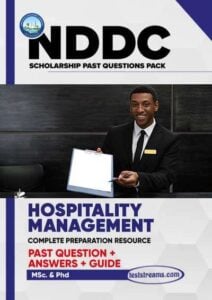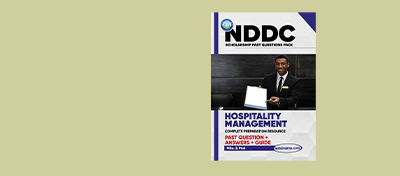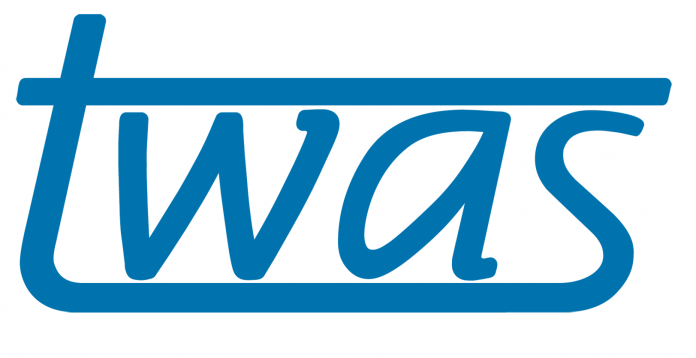NDDC Scholarship Past Questions And Answers – Hospitality Management PDF Download
The Niger Delta Development Commission (NDDC) offers various scholarships to support the educational aspirations of students from the Niger Delta region. One of the most sought-after scholarships is the NDDC Scholarship for Hospitality Management. If you are aiming to excel in this scholarship program, preparation is key. Familiarizing yourself with past questions and answers is an effective strategy to boost your chances of success.
The NDDC Scholarship for Hospitality Management is an excellent opportunity for aspiring scholars to advance their education and career in the field of hospitality. By utilizing past questions and answers as a study aid, you can significantly enhance your preparation and increase your chances of excelling in the scholarship examination. Make the most of these resources to build a solid foundation of knowledge and secure a promising future in the hospitality industry.
What Makes Our NDDC Scholarship Past Questions Stand Out?
- Comprehensive Coverage: Our collection spans multiple years, ensuring that you’re well-prepared for any surprises the exam might throw your way.
- Detailed Answers: Each question is accompanied by a comprehensive answer guide, allowing you to learn from your mistakes and reinforce your knowledge.
- Exam-Relevant Content: Our team of experts has painstakingly compiled the most relevant topics and questions that align with the NDDC Scholarship exam syllabus.
About NDDC Scholarship Test Style and Format (Updated)
NDDC overseas scholarship test was conducted by Cinfores-Ltd, between 2010 and 2015. Since 2016, the tests are now conducted by MEIL (MARG Educational International Limited).
The test usually comprises of 2 sections –
1. General questions which everyone will have to sit, and
2. Discipline-based questions.
For example, candidates in Engineering and Science related disciplines could take a mix of science-based questions like maths, English, physics, and chemistry for part1, then discipline-specific questions for part2
2016 and 2017 tests contained more discipline-specific tests and English language tests as general papers. The test usually lasts between 30 to 60 minutes.Sample Past Questions for NDDC Scholarship Aptitude Test – for Hospitality Management
What does the acronym FIFO stand for in the context of hospitality management inventory control?
A First In, First Out
B Fast Inventory Fast Out
C First Inventory First Out
D Fast In, Fast Out
Answer: A First In, First Out
Which of the following is an example of a fixed cost in a hotel business?
A Food and beverage expenses
B Employee wages
C Utility bills
D Mortgage payment
Answer: D Mortgage payment
Which of the following is an essential skill for effective guest relations management?
A Cooking expertise
B Time management
C Event planning
D Computer programming
Answer: B Time management
What does RevPAR stand for in the hotel industry?
A Revenue per Room
B Revenue per Restaurant
C Revenue per Rate
D Revenue per Reception
Answer: A Revenue per Room
Which department is primarily responsible for managing room reservations in a hotel?
A Human Resources
B Housekeeping
C Front Office
D Sales and Marketing
Answer: C Front Office
What is the purpose of a point of sale (POS) system in a hospitality business?
A Managing employee schedules
B Tracking guest complaints
C Processing financial transactions
D Monitoring room occupancy
Answer: C Processing financial transactions
Which of the following is an important factor in maintaining food safety standards in a hotel restaurant?
A Regular staff parties
B Proper refrigeration temperature
C Flexible menu options
D Weekly menu changes
Answer: B Proper refrigeration temperature
What does the term “yield management” refer to in the context of hospitality management?
A Maximizing room occupancy rates
B Efficient staff scheduling
C Increasing menu prices
D Implementing sustainability practices
Answer: A Maximizing room occupancy rates
Which of the following is a common strategy for reducing food waste in a hotel’s kitchen?
A Ordering more ingredients
B Implementing smaller portion sizes
C Allowing open buffets
D Preparing excess food
Answer: B Implementing smaller portion sizes
Which of the following is an example of a full-service hotel amenity?
A Self-service laundry
B Complimentary breakfast
C Limited dining options
D No housekeeping service
Answer: B Complimentary breakfast
What does the acronym CRM stand for in the context of hospitality customer service?
A Customer Relationship Management
B Customer Referral Management
C Current Reservation Management
D Call Reservation Management
Answer: A Customer Relationship Management
Which of the following is an important aspect of effective event planning in the hospitality industry?
A) Overlooking guest preferences
B) Ignoring budget constraints
C) Failing to communicate with vendors
D) Creating detailed event timelines
Answer: D Creating detailed event timelines
Which department is responsible for maintaining cleanliness and order in a hotel’s public areas?
A Food and Beverage
B Housekeeping
C Front Desk
D Engineering
Answer: B Housekeeping
What is the purpose of a SWOT analysis in the context of a hospitality business?
A Analyzing employee performance
B Assessing guest satisfaction
C Identifying strengths, weaknesses, opportunities, and threats
D Monitoring room occupancy trends
Answer: C Identifying strengths, weaknesses, opportunities, and threats
Which of the following is an example of a sustainable practice in the hospitality industry?
A Wasteful use of energy and resources
B Excessive use of disposable plastic products
C Implementing water conservation measures
D Disregarding guest feedback
Answer: C Implementing water conservation measures
What is the purpose of a balance sheet in the context of hotel financial management?
A Tracking room reservations
B Monitoring guest satisfaction
C Recording financial transactions
D Analyzing employee performance
Answer: C Recording financial transactions
What does the term “upselling” refer to in the context of hotel services?
A Promoting lower-priced services
B Encouraging customers to purchase additional or upgraded services
C Reducing service prices
D Limiting service options
Answer: B Encouraging customers to purchase additional or upgraded services
Which of the following is a key aspect of effective crisis management in the hospitality industry?
A Delayed communication with guests
B Blaming external factors
C Proactive communication and transparency
D Ignoring guest concerns
Answer: C Proactive communication and transparency
What does the term “A la carte” mean in the context of a hotel restaurant menu?
A Set menu with fixed prices
B Menu with limited options
C Buffet-style dining
D Menu with individual item prices
Answer: D Menu with individual item prices
Which of the following is an important factor in ensuring guest satisfaction in a hotel?
A Inattentive and unfriendly staff
B Slow response to guest requests
C Clean and well-maintained facilities
D Limited amenities and services
Answer: C Clean and well-maintained facilities





